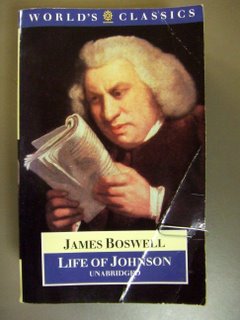An Ingenious Sophistry "Refuted"

Samuel Johnson was celebrated for his encyclopedic knowledge, literary and lexicographical feats and singular ability to distill his vast learning into pithy quips and memorable remarks. The trove of Johnson’s wisdom is captured in Boswell’s epic Life of Johnson which, like many classics, is undoubtedly referenced more than it is read. I boldly and confidently embarked on a reading of the classic, only to emerge after a mere 600 pages, if not defeated, somehow stymied. I still intend to finish it. But for now I am happy that I got most of what I was after: a healthy dose of Johnsonian sagacity with its characteristic ingredients of brevity, 18th century formality and a certain vehemence of expression. I was most in search of the exact incident in which Johnson “refuted”
After we came out of the church, we stood talking for some time together of Bishop Berkeley's ingenious sophistry to prove the non-existence of matter, and that everything in the universe is merely ideal. I observed, that though we are satisfied his doctrine is not true, it is impossible to refute it. I never shall forget the alacrity with which Johnson answered, striking his foot with mighty force against a large stone, till he rebounded from it, "I refute it thus." (Life of Johnson, Unabridged, Oxford University Press, 1970, p. 333)
Johnson, like some strange British incarnation of a Zen Master, does not respond to Berkeley's metaphysical puzzles with logic. He simply and suddenly exposes the "sophistry" through a physical argument, the kicking of the stone, much as the Zen Master would shock his pupil to awareness through a sudden blow to the head.
Labels: British Literature, Empiricism, Idealism, Philosophy



0 Comments:
Post a Comment
<< Home